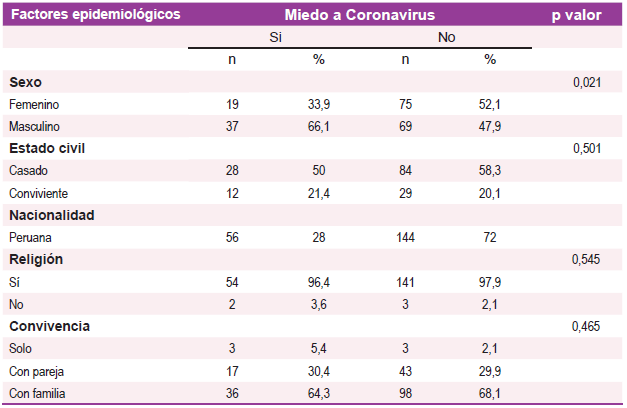Factores asociados al miedo hacia el coronavirus en profesionales de la salud que laboran en el primer nivel de atención
Palabras clave:
miedo, COVID-19, personal de salud, ansiedad y salud mentalResumen
Introducción: El miedo es un trastorno emocional que puede manifestarse también en
profesionales de la salud al enfrentarse a enfermedades infecciosas desconocidas. Esta
emoción puede desencadenar síntomas depresivos, que van desde el desánimo, la fatiga y
el desinterés hasta la falta de concentración. Objetivos: Determinar los factores asociados al
miedo hacia el coronavirus en profesionales de la salud que laboran en el primer nivel de atención
durante el año 2022. Materiales y métodos: El presente estudio es de tipo observacional,
transversal-analítico. La población de estudio estuvo conformada por 200 profesionales de la
salud que laboran en el primer nivel de atención. Se llevó a cabo un muestreo probabilístico de
tipo aleatorio simple. Para determinar la prevalencia del miedo hacia el coronavirus se aplicó
el instrumento “Escala de Miedo a COVID-19”. Para identificar los factores asociados al miedo,
se utilizó el instrumento de variables epidemiológicas y laborales. Los datos se procesaron
utilizando el paquete estadístico SPSSv28. Resultados: Se encontró una prevalencia del
miedo al coronavirus del 72%, relacionada con los factores epidemiológicos con el ser de sexo
femenino (p-valor 0.021) y los factores laborales tales como el tiempo trabajado (p=0.015) y el
acceso al equipo de protección individual (p-valor 0.003), todos con un valor estadísticamente
significativo. Conclusión: Los factores asociados al miedo hacia el coronavirus en profesionales
de la salud mostraron un impacto significativo en el sexo femenino, en el periodo laboral de 6
a 10 años y el acceso diario al equipo de protección individual.
Descargas
Citas
Satici B, Gocet-Tekin E, Deniz ME, Satici SA. Adaptation of the Fear of COVID-19 Scale: Its Association with Psychological Distress and Life Satisfaction in Turkey. Int J Ment Health Addict. 2021; 19(6): 1980-8. DOI: https://doi.org/10.1007/s11469-020-00294-0
Mertens G, Gerritsen L, Duijndam S, Salemink E, Engelhard IM. Fear of the coronavirus (COVID-19): Predictors in an online study conducted in March 2020. J Anxiety Disord. 2020; 74: 102258. DOI: https://doi.org/10.1016/j.janxdis.2020.102258
Organización Panamericana de la Salud (OPS) [Internet]. Washington: Salud Mental y COVID-19; 2020. https://www.paho.org/es/salud-mental-covid-19
Siyu C, Xia M, Wen W, Cui L, Yang W, Liu S, et al. Mental health status and coping strategy of medical workers in China during the COVID-19 outbreak. medRxiv. 2020; 5(3): 6-11. DOI: https://doi.org/10.1101/2020.02.23.20026872
Parrado-González A, León-Jariego JC. COVID-19: Factores asociados al malestar emocional y morbilidad psíquica en población española. Rev Esp Salud Publica. 2020; 94(8): e202006058.
Huang J, Han M, Luo T, Ren A, Zhou X. Mental health survey of 230 medical staff in a tertiary infectious disease hospital for COVID-19. Chin J Indust Hygiene Occup Diseases 2020; 38: E001. DOI: http://dx.doi.org/10.3760/cma.j.cn121094-20200219-00063
Tzur Bitan D, Grossman-Giron A, Bloch Y, Mayer Y, Shiffman N, Mendlovic S. Fear of COVID-19 scale: Psychometric characteristics, reliability and validity in the Israeli population. Psychiatry Res. 2020; 289: 113100. DOI: https://doi.org/10.1016/j.psychres.2020.113100
Wang C, Pan R, Wan X, Tan Y, Xu L, McIntyre RS, et al. A longitudinal study on the mental health of general population during the COVID-19 epidemic in China. Brain Behav Immun. 2020; 87: 40-8. DOI: https://doi.org/10.1016/j.bbi.2020.04.028
Cao W, Fang Z, Hou G, Han M, Xu X, Dong J, et al. The psychological impact of the COVID-19 epidemic on college students in China. Psychiatry Res. 2020; 287: 112934. DOI: https://doi.org/10.1016/j.psychres.2020.112934
Huarcaya-Victoria J, Villarreal-Zegarra D, Podestá A, Luna-Cuadros MA. Psychometric Properties of
Barrios I, Ríos-González C, O’Higgins M, González-Urbieta I, García O, Almirón-Santacruz J, et al. Psychometric properties of the Spanish version of the Fear of COVID-19 scale in Paraguayan population. Ir J Psychol Med. 2021; 38(4): 266-71. DOI: https://doi.org/10.1017/ipm.2021.5
Tannenbaum MB, Hepler J, Zimmerman RS, Saul L, Jacobs S, Wilson K, et al. Appealing to fear: a meta-analysis of fear appeal effectiveness and theories. Psychol Bull. 2015; 141(6): 1178-204. DOI: https://doi.org/10.1037/a0039729
Quadros S, Garg S, Ranjan R, Vijayasarathi G, Mamun MA. Fear of COVID 19 Infection Across Different Cohorts: A Scoping Review. Front Psychiatry. 2021; 12: 708430. DOI: https://doi.org/10.3389/fpsyt.2021.708430
Bao Y., Sun Y., Meng S., Shi J., Lu L. 2019-nCoV epidemic: address mental health care to empower society. Lancet. 2020; 395(10224): e37–e38. DOI: https://doi.org/10.1016/s0140-6736(20)30309-3
Ayittey FK, Ayittey MK, Chiwero NB, Kamasah JS, Dzuvor C. Economic impacts of Wuhan 2019-nCoV on China and the world. J Med Virol. 202; 92(5): 473-475. DOI: https://doi.org/10.1002/jmv.25706
Harbin A. Inducing Fear. Ethical Theory Moral Pract. 2020; 23(3-4): 501-13. DOI: https://doi.org/10.1007/s10677-020-10103-1
Andrade EF, Pereira LJ, Oliveira APL, Orlando DR, Alves DAG, Guilarducci JS, et al. Perceived fear of COVID-19 infection according to sex, age and occupational risk using the Brazilian version of the Fear of COVID-19 Scale. Death Stud. 2022; 46(3): 533-42. DOI: https://doi.org/10.1080/07481187.2020.1809786
Bakioğlu F, Korkmaz O, Ercan H. Fear of COVID-19 and Positivity: Mediating Role of Intolerance of Uncertainty, Depression, Anxiety, and Stress. Int J Ment Health Addict. 2021; 19(6): 2369-82. DOI: https://doi.org/10.1007/s11469-020-00331-y
Broche-Pérez Y, Fernández-Fleites Z, Jiménez-Puig E, Fernández-Castillo E, Rodríguez-Martin BC. Correction to: Gender and Fear of COVID-19 in a Cuban Population Sample. Int J Ment Health Addict. 2023; 21(1): 685. DOI: https://doi.org/10.1007/s11469-020-00377-y
Hosen I, Pakpour AH, Sakib N, Hussain N, AlMamun F, Mamun MA. Knowledge and preventive behaviors regarding COVID-19 in Bangladesh: A nationwide distribution. PLoS One. 2021; 16(5): e0251151. DOI: https://doi.org/10.1371/journal.pone.0251151
Lim GY, Tam WW, Lu Y, Ho CS, Zhang MW, Ho RC. Prevalence of Depression in the Community from 30 Countries between 1994 and 2014. Sci Rep. 2018; 8(1): 2861. DOI: https://doi.org/10.1038/s41598-018-21243-x
Wang C, Pan R, Wan X, Tan Y, Xu L, Ho CS, et al. Immediate Psychological Responses and Associated Factors during the Initial Stage of the 2019 Coronavirus Disease (COVID-19) Epidemic among the General Population in China. Int J Environ Res Public Health. 2020; 17(5): 1729. DOI: https://doi.org/10.3390/ijerph17051729
MacLeod S, Musich S, Hawkins K, Alsgaard K, Wicker ER. The impact of resilience among older adults. Geriatr Nurs. 2016; 37(4): 266-72. DPI: https://doi.org/10.1016/j.gerinurse.2016.02.014
Ribeiro PCPSV, Marques RMD, Ribeiro MP. Geriatric care: ways and means of providing comfort. Rev Bras Enferm. 2017; 70(4): 830-7. DOI: https://doi.org/10.1590/0034-7167-2016-0636
Jaspal R, Lopes B, Lopes P. Fear, social isolation and compulsive buying in response to COVID-19 in a religiously diverse UK sample. Ment Health Relig Cult. 2020; 23(5): 427-42. DOI: https://doi.org/10.1080/13674676.2020.1784119
Gasparro R, Scandurra C, Maldonato NM, Dolce P, Bochicchio V, Valletta A, et al. Perceived Job Insecurity and Depressive Symptoms among Italian Dentists: The Moderating Role of Fear of COVID-19. Int J Environ Res Public Health. 2020; 17(15): 5338. DOI; https://doi.org/10.3390/ijerph17155338
Mamun MA, Bodrud-Doza M, Griffiths MD. Hospital suicide due to non-treatment by healthcare staff fearing COVID-19 infection in Bangladesh? Asian J Psychiatr. 2020; 54: 102295. DOI: https://doi.org/10.1016/j.ajp.2020.102295
Lazzari D, Bottaccioli AG, Bottaccioli F. Letter to the Editor: Kim, S.-W., Su, K.-P. (2020) Using psychoneuroimmunity against COVID-19, Brain, Behavior, and Immunity (2020), doi: https://doi.org/10.1016/j.bbi.2020.03.025. Brain Behav Immun. 2020;87: 170-71. DOI: https://doi.org/10.1016/j.bbi.2020.05.036
Tan BYQ, Chew NWS, Lee GKH, Jing M, Goh Y, Yeo LLL, et al. Psychological Impact of the COVID-19 Pandemic on Health Care Workers in Singapore. Ann Intern Med. 2020; 173(4): 317-20. DOI: https://doi.org/10.7326/m20-1083.






